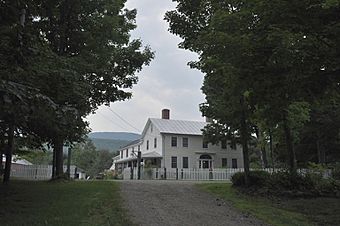McCleary Farm facts for kids
Quick facts for kids |
|
|
McCleary Farm
|
|
 |
|
| Lua error in Module:Location_map at line 420: attempt to index field 'wikibase' (a nil value). | |
| Location | South Strong Road, Strong, Maine |
|---|---|
| Area | 17 acres (6.9 ha) |
| Built | 1828 |
| Mural artist | Jonathan D. Poor |
| Architectural style | Federal |
| NRHP reference No. | 89000253 |
| Added to NRHP | April 7, 1989 |
The McCleary Farm is a very old farm in Strong, Maine. It was likely built around 1825 to 1828. This farm is special because of the beautiful paintings, called murals, on its walls. These murals were created by an artist named Jonathan Poor. The farm was added to the National Register of Historic Places in 1989, meaning it's an important historical site.
Exploring McCleary Farm
The McCleary Farm is located on South Strong Road. It sits on about 17 acres of land. This farm is a great example of an old New England farm. It has a main house connected to other buildings. These include a piggery and a chicken house. There's also an old barn and a blacksmith shop from the 1800s. A garage was added later.
The Main House
The main house is a rectangular building. It has 2-1/2 stories and is made of wood. It has a sloped roof and two chimneys inside. A porch with a hip roof covers one end of the house. The main door faces east. It has cool side windows and a rounded window above it.
Inside, the house has a central hallway. There's a living room and a parlor on each side. The kitchen is in the back and extends into another part of the house. There's also a bedroom in the back. The living room has fancy Federal style wood details. The parlor walls are covered with amazing painted murals.
The Amazing Murals
The murals in the McCleary Farm house are very special. They were painted by Jonathan Poor. He was an artist who traveled around Maine in the 1830s. Jonathan learned his painting skills from his uncle, Rufus Porter. Rufus Porter was also a traveling painter. He even wrote a book in 1825 called Curious Arts. This book gave tips on how to create murals.
The murals in the McCleary Farm show a typical New England countryside. You can see rolling hills, mountains, and old houses. There are also water scenes. These are all things Rufus Porter suggested painting. The murals use bright colors. Some small details were added using stencils.
History of the Farm
The McCleary Farm was started by Robert McCleary. He cleared the land for farming. The house itself was built for his son, William McCleary. This happened sometime between 1825 and 1828.
This farm is important for a few reasons. It's one of the oldest surviving houses in Strong. It's built with a strong post-and-beam style. Also, many of its original farm buildings are still standing. This includes the barn and the blacksmith shop. The blacksmith shop even has parts of its original forge.

